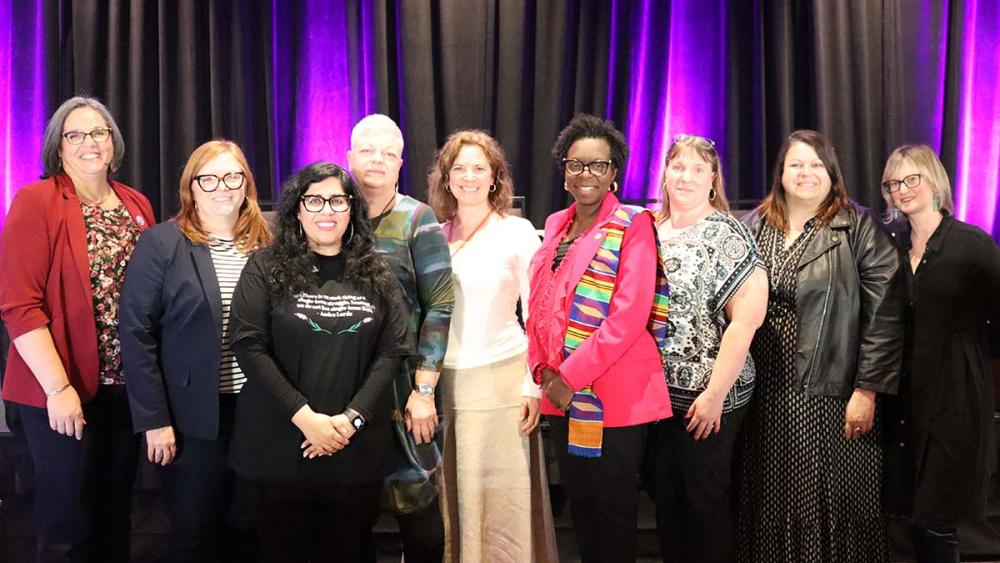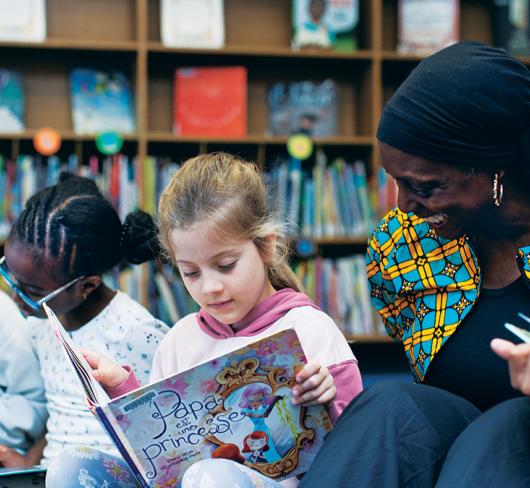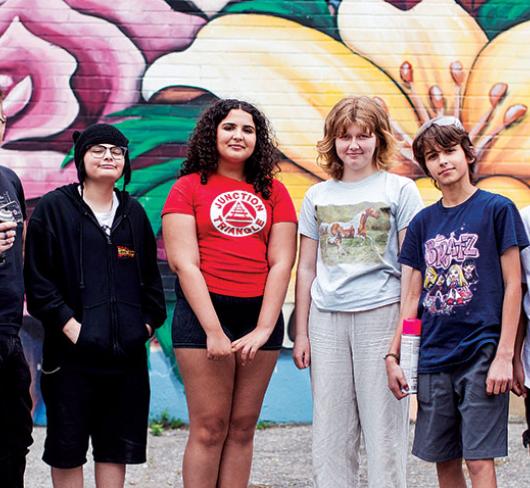
Reflecting on Women's History of ETFO at ASWR
Nkese Charles-Campbell: Thank you all so much for being here. I’d like to direct my first question to President Brown and then ask everyone on the panel to speak to it. I’d like to ask you to talk about how you became active in ETFO.
Karen Brown: I was hired by the Scarborough Board of Education during the time of the social contract in the Rae Days of the early 1990s. And I think they hired only about 15 individuals with special education qualifications that year. I was hired to work in a children’s mental health centre. When I started, there were two other teachers at the centre and they said, “We need a key teacher.” At the time, I didn’t know that a key teacher was a steward. They said it’s a good opportunity to meet other people, so I agreed and went to my first general meeting with the Scarborough Women Teachers’ Association. When I went to the general meeting, I asked a lot of questions. Because of that, I was tapped to be the local communications person. And I said, “Absolutely, I’d love to do that.” So I joined my local executive in a nonreleased capacity.
Shortly after that, as ETFO was beginning to form, I received a letter encouraging me to get involved in the Federation. I have the letter. It said, “The Federation of Women Teachers’ Association of Ontario has a long history of encouraging and supporting women to take leadership positions within the Federation, at school and in the community. Women teachers have a profound history of fighting for the rights of women and rights of teachers. Our Federation is going through many changes. Your leadership, Karen, is more important than ever. As we move toward a mixed-gender organization, the Elementary Teachers’ Federation of Ontario, alwe will need to have women speaking, organizing, leading, and contending for power at the local and provincial level. We will need to have role models and mentors for the ranks of young women to follow.” That letter began my involvement in the Federation, from the key teacher to the steward to a regional councillor to being on the local executive, a local VP, running for provincial Executive as a vice-president, first vice-president and eventually becoming president.
I hope through …and still we rise, you will take up the same invitation, you will take this call to get involved in your union and to make change through your leadership and participation, like I did. Together, we need to continue to fight for women’s leadership within our organization.
Susan Swackhammer: So that’s the way it’s supposed to happen, right? You’re supposed to go through these stages to get from your starting position to where you end up. That didn’t happen for me. I happened to work for a board that didn’t treat occasional teachers very well. That was before teacher unions were organizing occasional teachers. At that time, the Catholic board was paying almost twice as much to daily occasionals. And so, the Brant and Toronto occasional teachers joined OPSEU and I became an OPSEU member. I went to my first union meeting and came home the local president.
That was the end of October and the following February, we were on strike. This was the first strike of occasional teachers in the country with a union that knew really nothing about teachers. Less than two years after that strike, I was awarded a contract position with the board. Four women came to visit me, two principals, because they were still in the bargaining unit at that time, and two other members. They said, “We have a vacancy on the executive of the Women Teachers’ Association for second vice-president.” They told me that the president is newly elected, the first vice-president is newly elected … You don’t have to worry about what this means for you; it’s just a placeholder. Less than a year later, the president became a principal and didn’t think she could do the job halftime and the first vice-president refused to take the job of president because the board wasn’t giving full-time release even though the Federation of Women Teachers was paying for it. And so less than two years after being president of the occasional teachers, I was president of the teachers’ local.
I was tapped on the shoulder by these four women who came to me and said, we need you to do this. After I was elected president, I was tapped to run for a position with the Federation of Women Teachers in my region and I was successful there. When ETFO was formed in 1998, I was tapped on the shoulder to run to be the first vice-president of ETFO and I was successful in that role. And so, I wanted to speak to you about steps as you come up through the union, but it doesn’t always happen. Sometimes life happens on the way, and you just have to roll with it.
Sheilagh Turkington: I am not a teacher, but in 1994 I was an articling student. In the context of articling, I encountered teacher work and I loved it. I was drawn to it on a personal level because I am the daughter of a retired elementary school teacher, and I am the niece of five other retired elementary school teachers, who are my mother’s sisters. In working with the organization, especially in my younger years as a lawyer, I was so taken from a labour perspective by the depth of the bench strength, the degree of support and service that the FWTAO and later ETFO extended to their members. In my individual employment law practice (outside of labour law), I have seen many women, particularly above the age of 45 and 50, fired with no cause, with chances of re-employment shockingly low. ETFO is an organization where women can work decades in their passion. This is an organization that not only provides support and leadership opportunities but also legal representation when people encounter problems. Statistics show that women find that decade in their 50s the most challenging. Often it’s a combination of child care and elder care and menopause and burnout, and a whole host of other things going on. And you’re in a workplace that has support. Educators are in a workplace where if you falter, there are a host of incredibly skilled and committed individuals that will have your back. And that’s the strength of this organization and how I’ve come to value the privilege of working with ETFO.
Rachel Mishenene: My story includes me being really shy and quiet at one point, but ETFO really helped change that. As a high school dropout and as a young mother, I didn’t see education as something that suited my needs. As an Indigenous person, my stories were not reflected in an appropriate way, nor did I see myself in my learning. So, it really impacted my self-esteem and my confidence. When I was in my early 30s, I embarked on my teaching career. In my first year of teaching, ETFO had a women’s program called Leaders for Tomorrow. I didn’t really think about how important it would be to my life journey, where I would be taking my story and how it would evolve because of this program.
When I received the flyer about this program, I thought, this is a women’s leadership program. I’d like to go, but it’s not really for me; I don’t see myself as a leader. I thought, this program is for strong, confident women that would be in those positions. So I checked it out and threw it away. That was the first year that Leaders for Tomorrow was offered. The next year came around and I received the same flyer in the mail. And I had the president of our local come to me on the last day of school and say, “I think you’d be really great at this. You should consider going.” I thought about it, and I thought, you know what? Sure, I’ll check out this program. And I was accepted. All of a sudden, I was on a different path. You don’t know the impact that people have on your life until you actually let yourself go into those spaces where you think you might not belong. At Leaders for Tomorrow, my voice was equally important. Being the shy person that I was, I couldn’t look anybody in the eye. Well, things changed because of that program. And from that program, I ended up becoming a part of my local union and the social justice and equity chair. I also sat on ETFO provincial standing committees, bringing change forward at the provincial level.
If you want to see the change, you have to be that change. If you want something to change in your system, or in your school, then you might have to be the person who makes it happen. And if you feel that you are afraid and you can’t do that, well then lean on your union to help you. There are programs specifically for you, for every single woman here. If this is your first time coming to an ETFO event, I encourage you to look at other ways that you can be involved, because your voice is important.
NC: Thank you all so much, and Rachel, your answer was a great transition to my next question. We often hear people say that they are a product of women’s programs. What have ETFO women’s programs meant to you?
KB: At FWTAO, I saw so many powerful women leading, and I wanted to be part of that. When I got started, Women in Action was the program that was there to really propel women further within ETFO. Women’s programs are really important because they build your foundation and your leadership skills. Women’s programs also create safe spaces for women to build their confidence, to test their leadership and to receive encouragement from others. We all have different leadership styles. Believe it or not, when I was in eighth grade, my parents got a report card that said, “Karen needs to speak up in class.” I really had to work past being shy to develop my confidence.
I also remember going through my leadership journey at the local level and I was the only person in the local who had children. And we had no language within our constitution at that time about parental leave. We had to write that all in when I came back from my mat leave after just three months. I went to the annual meeting, there wasn’t any child care, there weren’t any child care provisions the following year. We had to fight for those things and really, we developed the skills and relationships to do that through women’s programs.
Why are we spending six per cent of our budget on women’s programs? Because it’s part of our foundation, because it’s needed to address both the demographics and the barriers women face. And then we also need to look at intersectionality, making sure that women who identify as Indigenous, 2SLGBTQ+, racialized, Black, those who identify with a disability, are reflected and have dedicated space within our organization. It’s very important that we continue to push to maintain these programs.
RM: I’m going to go back to the importance of your voice. You don’t know what your future looks like or if you’re going to stay in the classroom. I’m not teaching or part of the union anymore, but the skills I learned through women’s programs go beyond the classroom. If your career, your path, should ever change, the skills and tools from these programs will go with you. ETFO is one of the strongest unions in Canada that really focuses on women and women’s leadership. Take the opportunities these programs offer, learn the skills that will help you build your leadership, because you don’t know where it’s going to take you and the changes that you can make in your own communities.
I’ll give you an example. I’m from Thunder Bay and years ago Thunder Bay didn’t have a Pride event. Shortly after I came out, my son, who was 14 at the time, asked, “Why doesn’t Thunder Bay have Pride?” And I was like, I don’t know. He said, “We should start one.” So I connected with then Lakehead president Ellen Chambers, who was also a huge activist, and together with our union and our community we started Thunder Pride, which is currently in its 12th year. I attribute the confidence I had to work on that to the power of women’s programs.
NC: My next question is for Susan and Sheilagh. ETFO was formed in 1998, after negotiations concluded between the Federation of Women Teachers’ Associations of Ontario and the Ontario Public School Teachers’ Federation. Can you tell us what those negotiations were like and how securing funding for women’s programs became a foundational part of ETFO’s history and practice?
SS: I’ll begin with a very short history. There were two court challenges. Two women from FWTAO launched a Charter challenge to say that they were being discriminated against because they were being forced to be in a women’s union. It went all the way to the Supreme Court, and in the end, FWTAO was successful. But at the same time, these same women had gone to the Ontario Human Rights Commission and launched a complaint under the Ontario Human Rights Code to say they were being discriminated against. The Ontario Human Rights Commission upheld that complaint and the justice at the time said the two unions had to join together to form a new organization.
The women who were activists in FWTAO wanted no part of this new organization; they had 100 per cent of the money, they had 100 per cent of the executive, they had 100 per cent of the staff jobs, they had 100 per cent of all the programs and anything less than that was a failure to them. The activists at OPSTF wanted no part of the six per cent funding dedicated to women’s programs and also didn’t want designated positions for women. It was a complex negotiation, but I would say the Federation of Women Teachers was very successful in three ways. First, that there is six per cent funding for women’s programs. Second, that there are designated positions for women. And third, and I think most important, is that in order to change the constitution and bylaws, you had to have an enriched majority (66 per cent). If not for the enriched majority in those first few years, that six per cent funding for women’s programs and those designated positions for women would have been gone.
ST: There are two things that I would add to the history that Susan shared that go decades back. Establishing the Federation of Women Teachers’ Associations was a response to the huge growth in the number of women teachers across the province who were paid atrociously lower than their male counterparts and were dealing with a host of issues that were very gender-specific. Sometimes it was a question of harassment, sometimes it was a question of respect. Sometimes it was a question of conditions in rural, one-room schoolhouses with 25 kids or more and a huge range of grades. So, the history of FWTAO before 1998 was about women coming together to improve the conditions of other women teachers.
The second piece I’ll just add, is that we have a legislative system that within the human rights context allows for special programs like percentage designation and women’s programs. It’s not enough to just treat everybody the same. Sometimes we need special programs to alleviate the disadvantage of the groups that have the disadvantages.
NC: Final question, to Rachel. You have participated in women’s programs and run women’s programs as staff at the provincial office, specifically programs that encourage participation from members of designated groups. Can you speak to the way ETFO has grown and evolved in its equity work?
RM: When I think about equity work at ETFO, I think about my role working at the provincial office. ETFO had a designated position for an Indigenous educator to help members learn about Indigenous education in Ontario. I felt like this was such an honour and I am forever grateful for that opportunity because that really was a gift for me. When I look at my role in Indigenous education, I have a responsibility to my people, first and foremost. But I also have a responsibility to you. To ensure that you’re given the right tools and resources as educators, those that reflect stories and realities of Indigenous people. That way, you’re able to walk alongside us as an ally in reconciliation. So, working at ETFO, one of the first things I had was a budget for a women’s program to bring together women who identify as First Nations, Métis and Inuit. I contacted the few Indigenous women leaders that I knew at ETFO to come and share their stories with the group. Twenty-six Indigenous women registered, and I was blown away. This was my first experience ever in a space with that many Indigenous educators who were women.
That program for Indigenous women continues to this day, and those women and the ones that have come after continue to be tapped on the shoulder to lead in their union. So I encourage you to get involved in the programs that are available, because every time you push yourself, you’re learning something new about yourself. Equity in ETFO has come a long way and it’s really nice to listen to these stories and see all these women who have been a part of this journey.
Nkese Charles-Campbell is an executive officer of the Upper Grand Teacher Local.

